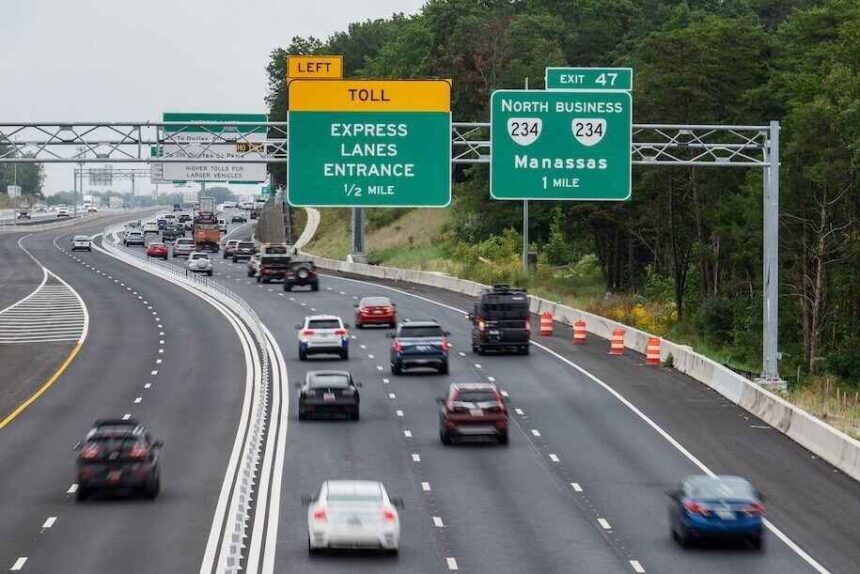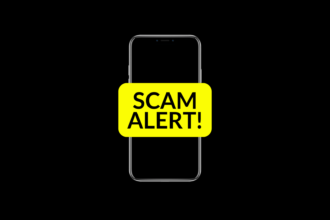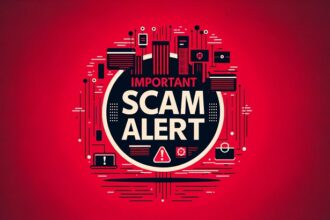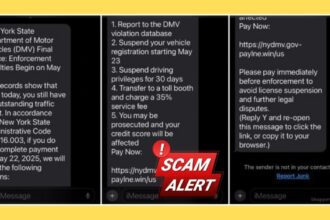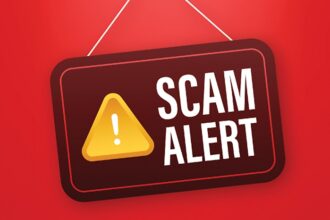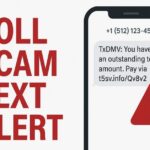Drivers across California are being targeted by a sophisticated phishing scam involving fake text messages claiming to be from Metro ExpressLanes, FasTrak, and other toll agencies. These deceptive messages threaten recipients with penalties, legal action, and even license suspension if they don’t pay alleged “unpaid tolls” immediately. California Attorney General Rob Bonta has issued an urgent warning about this widespread scam that has already affected thousands of motorists.
“Scammers are often quite literally in our pockets, just a text away,” Attorney General Bonta said in a recent statement. “Text-based toll charge scams are on the rise, and knowing what to look for is an important way to keep consumers safe against these tactics.”
Overview of Metro Express Lanes Unpaid Toll Violation Scam
The scam has led to a flood of complaints to the Los Angeles County Metropolitan Transportation Authority (Metro) from concerned drivers. Many victims report receiving threatening messages despite never using toll lanes, suggesting scammers are casting a wide net rather than targeting specific toll users.
The fraudulent texts have been reported across multiple California regions, including:
- Los Angeles County (Metro ExpressLanes)
- Orange County (The Toll Roads)
- San Francisco Bay Area
- San Diego County
- Riverside and San Bernardino Counties
According to Metro officials, the ExpressLanes system has not been compromised, and no customer information has been breached. Instead, scammers appear to be randomly targeting phone numbers within California area codes, affecting both actual FasTrak users and non-users alike.
How the Scam Works
These phishing attempts follow a predictable pattern designed to exploit fear and urgency:
- Initial Contact: Victims receive a text message claiming to be from Metro ExpressLanes, FasTrak, or another toll authority stating they have an unpaid toll balance.
- Creating Urgency: The message typically includes a tight deadline (often within 24-48 hours) and threatens severe consequences for non-payment.
- Providing a “Solution”: The text includes a link to a fraudulent website designed to look like an official toll payment portal.
- Data Theft: Once on the fake website, victims are prompted to enter personal and financial information, which scammers then use for identity theft or fraudulent charges.
- Optional Manipulation: Some texts ask recipients to reply “Y” to “activate” the link, a tactic designed to bypass smartphone security features.
The entire scheme relies on creating enough panic that recipients act quickly without verifying the message’s legitimacy. The relatively small amounts requested (typically under $10) further encourage victims to pay without questioning, as many consider it easier to pay than to investigate.
Common Metro Express Lanes’ Fake Text Patterns and Examples
The scam texts follow similar templates, though the specific wording may vary. Here are examples of typical messages:
Toll Violation Notice: This is your final notice regarding the unpaid toll balance on your account. You must settle the balance within the next 12 hours to avoid severe penalties. Unpaid Balance: $6.99. Due Date: [Near Future Date]. Failure to pay within this time frame will result in the following: 1. Immediate addition of late payment fees to your balance 2. Suspension of your vehicle registration by the metro express lanes 3. Collection actions, including a negative report to your credit file.
Metro Express Lanes Final Reminder: You have an outstanding toll. Your toll account balance is outstanding. If you fail to pay by [specific date], you will be penalized or subject to legal action.
Pay your FastTrak Metro Express Lanes tolls by [date]. To avoid a fine and keep your license, you can pay at [fraudulent URL]. (Please reply Y, then exit the text message and open it again to activate the link, or copy the link into your Safari browser and open it)
These messages are designed to look official while creating a false sense of urgency. They often misspell “FasTrak” as “FastTrak” and may come from suspicious email addresses or phone numbers with unusual formats.
Red Flags to Watch For
Several telltale signs can help identify these fraudulent messages:
1. Suspicious Sender Information
- Email addresses with unusual domains (e.g., “@heartblocked-web.de”)
- Phone numbers that are longer than standard 10-digit US numbers
- Numbers with international country codes (particularly +63, which has been frequently reported)
2. URL Red Flags
- Domains that add characters after “.com” (e.g., “thetollroads.com-twho.top”)
- Misspelled domain names
- Unusual domain extensions (.top, .xyz, etc.)
- URLs that don’t match the official toll agency websites
3. Message Content Warning Signs
- Demands to reply “Y” to “activate” a link
- Threats of license suspension (toll agencies cannot suspend your license)
- Extremely short payment deadlines (12-24 hours)
- Poor grammar or unusual phrasing
- Misspelling of “FasTrak” as “FastTrak”
4. Unusual Payment Requests
- Requests for payment methods not typically used by legitimate toll agencies
- Requirement to enter detailed financial information on a suspicious website
- Unusually small dollar amounts (typically under $10)
Protecting Yourself from Fraudulent Metro Express Lanes Toll Texts
If you receive a text message claiming to be from a toll authority, follow these steps to protect yourself:
DO NOT:
- Click on any links in the message
- Reply to the message (even with “STOP” or “Y”)
- Call phone numbers provided in the message
- Provide any personal or financial information
DO:
- Delete the message immediately
- Check your toll account directly through the official website:
- Metro ExpressLanes: https://metroexpresslanes.net/
- The Toll Roads: https://thetollroads.com/
- Bay Area FasTrak: https://bayareafastrak.org/
- 91 Express Lanes: https://91expresslanes.com/
- 405 Express Lanes: https://405expresslanes.com/
- Riverside Express: https://riversideexpress.com/
- SANDAG: https://www.sandag.org/fastrak/
- Report the scam to:
- Federal Trade Commission: https://reportfraud.ftc.gov/
- FBI Internet Crime Complaint Center: https://www.ic3.gov/
- California Attorney General: https://oag.ca.gov/contact/general-contact-form
If you’ve already clicked a link or provided information, take these additional steps:
- Monitor your bank and credit card statements
- Consider placing a fraud alert on your credit reports
- Change passwords for any accounts that may be compromised
- Contact your bank or credit card company if you provided financial information
Real-World Impacts
Scams like these can have serious consequences beyond the immediate financial loss. Reddit users have shared numerous experiences with these fraudulent texts:
One user reported receiving multiple charges despite never using the express lanes: “I’ve never even entered the metroexpress lane once eversince the establishment in 2009? 2010? Metro had the audacity to charge me for a toll I’ve never used.”
Another user who fell victim to the scam shared: “The scary thing is that it brings you to the actual FastTrak government site. But once you hit the link your card info is brought to the scanner. I had to shut down two cards after they tried running a fraudulent payment through and it’s been a nightmare.”
Former employees of toll systems have also confirmed deceptive practices, with one commenting: “If you were in the fast lane then the antenna picked up your tag from the adjacent toll lane antenna. I ran those tests for ‘spill over’ on the 10 and 110.”
How Legitimate Toll Agencies Communicate
Understanding how legitimate toll agencies actually communicate can help you identify scams:
- For non-account holders: Toll violations are sent via postal mail, not text messages
- For account holders: Communications are primarily through your online account portal or email
- Payment requests: Legitimate agencies don’t demand immediate payment via text
- Documentation: Real violations include clear photos of your vehicle in the toll lane
- Verification: Legitimate notices include detailed information about the specific violation
Metro ExpressLanes has explicitly stated they “never send text messages asking for sensitive information or requesting payment.”
Frequently Asked Questions
1. Is a Metro Express Lanes “Final Reminder” or “Unpaid Toll” text legitimate?
No. Metro ExpressLanes and other California toll agencies do not send text messages requesting payment or threatening penalties. All legitimate toll violations are sent via postal mail with proper documentation.
2. What should I do if I already clicked on a link in a scam toll text?
If you’ve already clicked a link, monitor your financial accounts closely, change passwords for any accounts that may be compromised, and consider placing a fraud alert on your credit reports. Contact your bank immediately if you provided financial information.
3. How can I verify if I actually owe toll fees?
Visit the official website of the toll agency directly (not through any links in texts or emails) and log into your account or search by license plate number. You can also call the official customer service number listed on their website.
4. Can toll agencies suspend my license or vehicle registration?
While unpaid toll violations can eventually affect your vehicle registration renewal after multiple notices and a long period of non-payment, toll agencies cannot immediately suspend your license as many scam texts threaten.
5. Why do these scammers target people who don’t even use toll roads?
Scammers are sending messages to random phone numbers within targeted area codes, hoping to catch enough people who either use toll roads or are uncertain enough to pay without questioning. The low dollar amounts requested make it more likely people will pay “just in case.”
Conclusion
The Metro ExpressLanes text scam represents a sophisticated attempt to exploit California drivers through fear tactics and impersonation of legitimate government agencies. By understanding how these scams work and recognizing the warning signs, you can protect yourself from becoming a victim.
Remember the golden rule: legitimate toll agencies do not initiate payment requests via text message. If you receive such a message, the safest course of action is to delete it immediately and check your account through official channels.
As Attorney General Bonta advised, “I urge Californians to take practical steps to guard against being victimized by scammers, including visiting official websites only and talking to friends and family who may be unaware of these dangers.”
By staying vigilant and spreading awareness of these scams, we can collectively reduce their effectiveness and protect our communities from fraud.
Sources: California Attorney General’s Office, Los Angeles County Metropolitan Transportation Authority, Federal Trade Commission, user reports from Reddit
